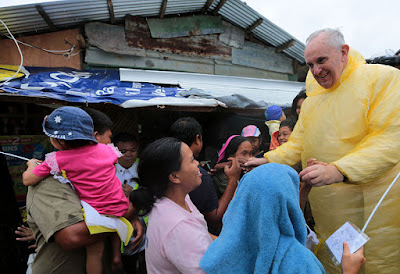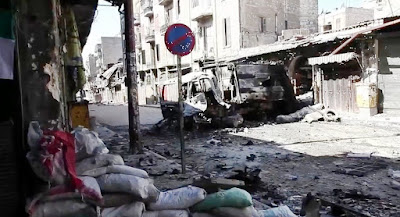Aleppo, Syria [Wikipedia]
Readings (New American Bible: Philippines, USA)
Readings (Jerusalem Bible: Australia, England & Wales, India [optional], Ireland, New Zealand, Pakistan, Scotland, South Africa)
Gospel Matthew 24:37-44 (New Revised Standard Version, Catholic Edition, Canada)
Jesus said to his disciples: For as the days of Noah were, so will be the coming of the Son of Man. For as in those days before the flood they were eating and drinking, marrying and giving in marriage, until the day Noah entered the ark, and they knew nothing until the flood came and swept them all away, so too will be the coming of the Son of Man. Then two will be in the field; one will be taken and one will be left. Two women will be grinding meal together; one will be taken and one will be left. Keep awake therefore, for you do not know on what day your Lord is coming. But understand this: if the owner of the house had known in what part of the night the thief was coming, he would have stayed awake and would not have let his house be broken into. Therefore you also must be ready, for the Son of Man is coming at an unexpected hour.
One will be taken and one will be left (Matthew 24:40 and 41).
In February 2000 a friend of mine, Daisy, an engineer who teaches at Xavier University, Cagayan de Oro, was travelling home to Ozamiz City for the weekend. This involved a journey of about three or four hours by road to Mukas, Kolambugan, Lanao del Norte, where the bus then went on board a ferry for the 20-minute trip across Panguil Bay to Ozamiz City. While waiting for the bus to take the next ferry from Mukas Daisy got off and bought some crabs, a favourite with Filipinos.
Because of the crabs Daisy went up on the upper deck of the ferry instead of sitting in the bus. Halfway across the bay there was a huge explosion. 37 passengers on the three buses on board were killed and others injured.
Then two will be in the field; one will be taken and one will be left. Two women will be grinding meal together; one will be taken and one will be left. We could add, Two women will be travelling together in a bus; one will be taken and one will be left.
On Thursday 21 November 2013 Pope Francis met the Filipino community in Rome in St Peter’s Basilica. With them, in the light of the recent calamities in the Philippines, a powerful earthquake in October and Super Typhoon Haiyan/Yolanda in November, he asks why these things happen.
Pope Francis doesn’t offer any easy answers. He encourages us to ask God ‘Why?’, like little children, as this will catch the attention of our loving Father.
The ending of the old liturgical year and the beginning of the new both remind us of the importance of being ready whenever the Lord comes. This readiness is essential both for the individual and for the whole Christian community. When Jesus returns will he find that we have built a community where God’s justice reigns? At the moment of the death of each of us will be in a right relationship with God? Will we have directed our lives towards him?
One way to be ready for whatever may come is to go to confession regularly.

Pope Francis with victims of Haiyan/Yolanda
Palo, Leyte, 17 January 2015 [Wikipedia]
The old hymn, O Christ who art the light and day, a translation by R. R. Terry of the original Latin Christe Qui Lux Es Et Dies, in a setting here by English composer William Byrd, is often sung as part of Compline, the Night Prayer of the Church. It is a hymn that recognises the reality of sin but also God’s desire to protect us. Though it’s not specifically an Advent hymn it recalls the purpose of that blessed season that we are just beginning: to prepare to celebrate the First Coming of Jesus at his birth but also to prepare for his daily coming into our lives and for his Second Coming at the end of time.
Antiphona ad Introitum
Entrance Antiphon Cf. Psalm 24[25]:1-3
Ad te levávi ánimam meam, Deus meus,
To you, I lift up my soul, O my God.
in te confído, non erubéscam.
In you, I have trusted; let me not be put to shame.
Neque irrídeant me inimíci mei,
Nor let my enemies exult over me;
étenim univérsi qui te exspéctant non confundéntur.
and let none who hope in you be put to shame.

